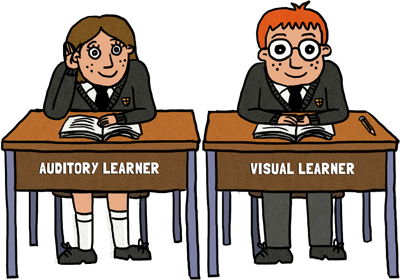

If you believe you may be an auditory learner, then strongly consider incorporating one or more of the following recommendations into your bar study schedule. Unlike peers who labor over flashcards and flowcharts, you do not learn best by writing information out or seeing images, pictures, color, and other visual media. When confronting a new, written task, you may talk yourself through it, and you often read e-mails, class handouts, or any other written information out loud, regardless of whether or not anyone else could overhear you.

You like receiving verbal directions, and often find them easy to follow. More likely than not, it wasn’t the end of the world if you were called on in class, and, in fact, you may have even felt invigorated by these discussions. In school, you likely noticed that you enjoyed class lectures and discussions. If you’re an auditory learner, hearing and speaking about what you are learning generally works best for you.
Auditory learner how to#
If you’ve ever sat down to study and thought to yourself, “If only this material was presented in a way geared towards auditory learners, I could memorize these rules and become a better IRAC writer,” then this article is for you! How to Spot an Auditory Learner

One way of doing this is modifying your study habits to best align with your preferred learning style. You invest time and money to prepare for your exam so be sure to get the most out of your study material.TSM has provided every narrative definition in our program with an accompanying audio file for auditory-supported learning.While there are no real tricks or shortcuts to preparing for the bar, you can and should study in a manner that will best help you obtain that passing score. Participate in group discussions of exam materialįinding your learning style is crucial to your exam preparation.Describe information in detail including steps and processes.Record your reading of questions and answers in a voice memo app.Read each exam question out loud then verbalize the answer.Listen to recordings of exam questions and study material.You read questions out loud then you provide the answers.You discuss answers versus write out answers.You like someone to tell you directions versus reading directions.You find it helpful to have someone ask the question, and you verbalize the answer to them.Knowing your learning style can cut down on test-taking anxiety and frustration. Auditory learners can absorb and recall information better when it is delivered through hearing. Someone who is an auditory learner doesn’t mean that they don’t also learn information from visual and kinesthetic styles. Speaking the information helps them remember it better. For example, someone with this learning style will find it helpful to read the exam questions out loud and answer them. Also, they are better able to retain information if they read it out loud and then listen to the recording. This post will explore everything you need to know about auditory learning.Īn auditory learner finds the most benefit from listening to study material and questions. Over the next few weeks, we will explore each of these. There are three major learning styles which include auditory, visual, and kinesthetic. As you prepare for your exam, it is helpful to identify how you learn and retain information.

If your learning style is auditory and your study program is 90% visual, then you will less likely remember the information for the exam.Įach person learns information differently. When you are learning new material, do you read it aloud? Is it helpful to hear the information read to you? Do you prefer learning through lectures and discussions versus reading? If these ways of learning are useful, you may be an auditory learner. Kristie Overstreet Ph.D., LPCC, LMHC, LPC, CST


 0 kommentar(er)
0 kommentar(er)
